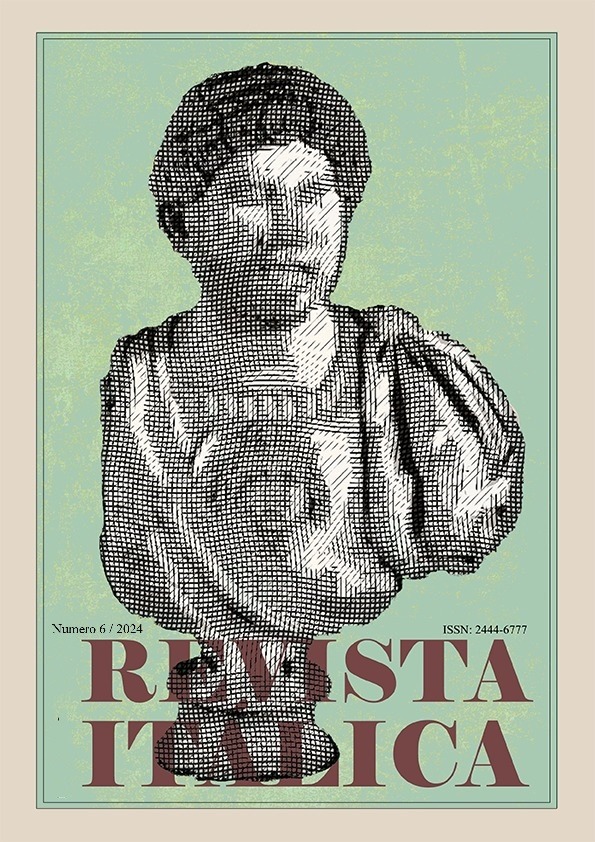A crisis with an alternative?:
Analysis of the rejected rogationes in the Roman Republic between 70 and 49 B.C.
Keywords:
rogatio, rogator, comitia, crisis, reformAbstract
It is commonly accepted by modern historiography that the end of the Roman Republic and the beginning of the Principate were both events that the political class of Rome was no table to comprehend nor solve. However, a detailed analysis of the 35 legislative proposals that were rejected shows that there was an important part of the Roman political class who was aware that some reform was needed to ensure the survival of the Republic. These legislative proposals were not passed due to several reasons, some of them being the opposition of the more conservative elements of Roman politics and the outbreak of violence.
Downloads
References
ALCHOURRÓN, C. E. Y BULYGIN, E. (2000): Norma Jurídica, en E. Garzón Valdés y F. J. Laporta (eds.), El derecho y la justicia, Madrid, Editorial Trotta, 133-148.
BRUNT, P. A. (1968): Review of Res publica amissa. Eine Studie zu Verfassung und Geschichte der römischen Republik, The Journal of Roman Studies, 58, 229-232. Disponible en: https://www.jstor.org/stable/299710https://doi.org/10.2307/299710
CRAWFORD, M. (1992): The Roman Republic, Cambridge (Mass.), Cambridge University Press.
DUPLÁ ANSUÁTEGUI, A. (2021): Violencia política en la crisis de la República Romana, Pasado Abierto, 14, 51-74. Disponible en: https://fh.mdp.edu.ar/revistas/index.php/pasadoabierto/article/view/5516/5824
ELSTER, M. (2020): Die Gesetze der späten römischen Republik: von den Gracchen bis Sulla (133-80 V. Chr.), Göttingen, Verlag Antike.https://doi.org/10.13109/9783946317647
HÖLKESKAMP, K.-J. (2019): La cultura política de la República romana: un debate historiográfico internacional, Zaragoza, Prensas de la Universidad de Zaragoza.
JEHNE, M. (2006): Methods, Models and Historiography, en N. Rosenstein y R. Morstein-Marx (eds.), A Companion to the Roman Republic, Oxford, Blackwell Publishing, 3-28.https://doi.org/10.1002/9780470996980.ch1
LEACH, J. (1978): Pompey The Great, Londres, Croom Helm.
LEPOR (2012): Leges Populi Romani. Disponible en: http://telma.irht.cnrs.fr/outils/lepor/introduction/ [Consultado el 20/3/2023]
LINTOTT, A. W. (1965): Trinundinum, The Classical Quarterly, 15 (2), 281-285. Disponible en: https://www.jstor.org/stable/637922
https://doi.org/10.1017/S0009838800008958
LINTOTT, A. W. (1968): Violence in Republican Rome, Oxford, Clarendon Press.
LYNDSAY, H. (2009): Adoption in the Roman World, Cambrigde, Cambridge University Press.
MANUWALD, G. (2018): Cicero: Agrarian Speeches, Oxford, Oxford University Press.
MEIER, C. (1966): Res publica amissa. Eine Studie zu Verfassung und Geschichte der römischen Republik, Wiesbaden, Steiner Franz Verlag [non vidi].
MILLAR, F. (1998): The Crowd in the Late Roman Republic, Michigan, The University of Michigan Press.
https://doi.org/10.3998/mpub.15678
MOURITSEN, H. (2001): Plebs and politics in the Late Roman Republic, Cambridge, Cambridge University Press.https://doi.org/10.1017/CBO9780511482885
PINA POLO, F. (1989): Las contiones militares y civiles en Roma, Zaragoza, Universidad de Zaragoza.
PINA POLO, F. (1999): La crisis de la República (133-44 a.C.), Madrid, Síntesis.
PINA POLO, F. (2005): Marco Tulio Cicerón, Barcelona, Editorial Ariel.
RAMSEY, J. T. (2016). How and why was Pompey Made Sole Consul in 52 BC?, Historia: Zeitschrift Für Alte Geschichte, 65(3), 298-324. Disponible en : http://www.jstor.org/stable/45019234https://doi.org/10.25162/historia-2016-0017
ROLDÁN, J. M. (1987): La república romana, Madrid, Cátedra.
ROSILLO LÓPEZ, C. (2010): La corruption à la fin de la République romaine (II-I s. av. J.-C.) : aspects politiques et financiers, Neuchâtel, Université de Neuchâtel.
ROTONDI, G. (1912): Leges Publicae Populi Romani, Milán, Società Editrice Libraria Milano.
RUSSELL, A. (2022): The Tribunate of the Plebs: between Compromise and Tradition, en V. Arena y J. Prag (eds.), A Companion to the Political Culture of the Roman Republic, Chichester, John Wiley & Sons Ltd, 260-274.https://doi.org/10.1002/9781119673675.ch19
TATUM, W. J. (1999): The Patrician Tribune: Publius Clodius Pulcher, Chapel Hill, The University of North Carolina Press.
WILLIAMSON, C. (2005): The Laws of the Roman People, Michigan, University of Michigan Press.https://doi.org/10.3998/mpub.15992
YAKOBSON, A. (1999): Elections and Electioneering in Rome. A Study in the Political System of the Late Republic, Stuttgart, Steiner Franz Verlag.

Downloads
Published
How to Cite
Issue
Section
License
1. Authors retain copyright and grant the journal the right to be the first to publish the work and to do so under a "Creative Commons Attribution-NonCommercial 3.0 Spain" (CC-by-nc-sa) licence, unless otherwise indicated.
2. This licence allows others to share, copy, distribute and publicly communicate the work, as well as to make derivative works as long as the work is attributed to the author(s), is not used for commercial purposes and is shared under the same licence.
You can consult the informative version and the legal text of the licence here. This must be expressly stated in this way when necessary.
3. Authors may separately enter into additional agreements for the non-exclusive distribution of the version of the work published in the journal (e.g. placing it in an institutional repository or publishing it in a book), with an acknowledgement of its initial publication in this journal.
4. Authors are allowed and encouraged to disseminate their work electronically (e.g., in institutional repositories or on their own website) before and during the submission process, as it may lead to productive exchanges, as well as earlier and higher citation of published work (see The Effect of Open Access).

 Universidad Pablo de Olavide
Universidad Pablo de Olavide